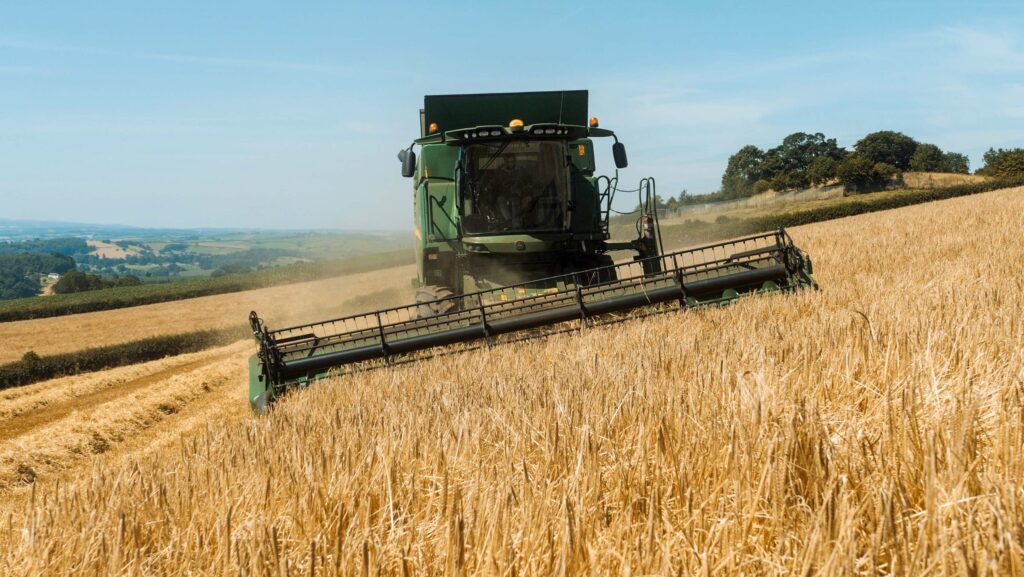Harvest 24: Variable wheat and OSR reflect unforgiving season
 © Hanlons Brewery
© Hanlons Brewery Harvest is making good progress in the South and East with excellent conditions for the combine – but farmers are feeling the pressure of an unforgiving growing season.
See more: Harvest 24 – wheat yields better than expected on Wilts Estate
Devon
James Lee, who farms near Crediton alongside father Nick and brother Jon, is into his winter barley after completing the oilseed rape.
Oilseed varieties of choice this year were Attica and Aspire; the latter outperforming the former by 1t/ha at 4.7t/ha. “Cabbage stem flea beetle has not been a problem for us,” said James.
“The risk is relatively low but we also apply muck at establishment – it helps the crop along and the smell is also supposed to act as a natural deterrent.”
The farm grows winter barley for seed, which is supplied to Agrii, and the combine is busy in two-row varieties Memento and Caravelle. On light soil after maize, yields have averaged 8.2t/ha and 8.7t/ha, respectively.
“We’ve also got Bolivia to go at which is another seed crop,” explained James, who is comparing barley performance after ploughing versus direct drilling.
Next up will be winter wheat, comprising hard Group 4 varieties Dawsum and Graham, and soft Group 4 Redwald. James is guarded about yield expectations following higher septoria pressure than last year.
Westminster spring barley and maize are also in his rotation – the barley grown as a seed crop for Limagrain, and the maize goes predominantly to a local dairy farmer.

© Hanlons Brewery
Dorset
Further east, Clive Tory is into oilseed rape at Lower Almer Farm near Blandford Forum. Crop height is somewhat lacking, but yields are still above the 4t/ha three-year average.
“We’re growing around 71ha of Auckland and Ambassador,” he said, “and I’m pleased with how they have performed so far.”
Moisture is low at 6-9%, and Clive is awaiting the results of oil content analysis.
The winter wheat is offering promise – and disappointment. “We have grown Palladium in place of Extase this year. I’m very pleased with how it’s looking.”
However, Graham has suffered badly from septoria, and will be swapped out.
“We also have 71ha of Vespa winter beans, which are looking really well; I’m feeling very positive about them.”
Berkshire
Like many others, Colin Raynor is facing the challenges of an unforgiving growing season at Berkyn Manor Farm near Windsor.
The 50ha of six-row barley Kingsbarn usually does well, but has struggled in this year’s conditions, he said.
“The majority of the crop had wet feet for 60% of the growing season. It looked like it would make 8-9t/ha, but the reality is quite stark, with yields at less than 6t/ha. Oddly, the specific weights weren’t bad at 78kg/hl.”
A saving grace has been the 12% moisture, which has reduced drying costs.
Good in places, the 100ha oilseed rape is in its last year as the costs and risk of growing the crop now outweigh the gains.
“It has become unviable for us; there is too much risk if the crop doesn’t make 3.7t/ha.”
Colin has also made headway with his 300ha of Skyfall winter wheat, though yields have been affected by blackgrass despite pre- and post-emergence applications.
“Where the application has worked we’ve achieved 9t/ha, where it has failed, 7t/ha,” he said. “We’ve always managed to keep on top of blackgrass, until this year; the conditions have made it very difficult.”
Despite an 11% protein, 76kg/hl specific weight and 325 Hagberg, the grain will go as feed. Colin said the £10/t premium is not worth the risk of having a lorry rejected.
Harvest will conclude with 81ha of maize. “The maize is looking fantastic – that, I am excited about.”
Lincolnshire
Further north, Ben Atkinson will soon be taking the combine into winter wheat at Grange Farm, Rippengale, following completion of 486ha each of oilseed rape and winter barley.
Cabbage stem flea beetle, coupled with poor ground conditions, resulted in patchy fields of oilseed rape with space for blackgrass to infiltrate. Harvesting in high temperatures, the crop came in as low as 5% moisture with yields averaging 3t/ha. Oil content has been acceptable at 46%.
“The average is below previous years [4-5t/ha],” said Ben. “We’ll be growing a lot less oilseed rape next year. The finances are just not stacking up.”
The winter barley has a slightly better tone, with the hybrid Kingston producing 9.25t/ha. “In previous years we’d be doing over 10t/ha – but it has performed better than expected given the extreme October weather at drilling,” he said.
The extreme conditions also explain a rise in his spring crop acreage, from 25% to 40% of his 3,035ha of contracted and rented ground, comprising barley, wheat, beans and sugar beet.
Ben has positive expectations for his hard Group 4 winter wheat, Dawsum: “It looks clean and full of promise.”

